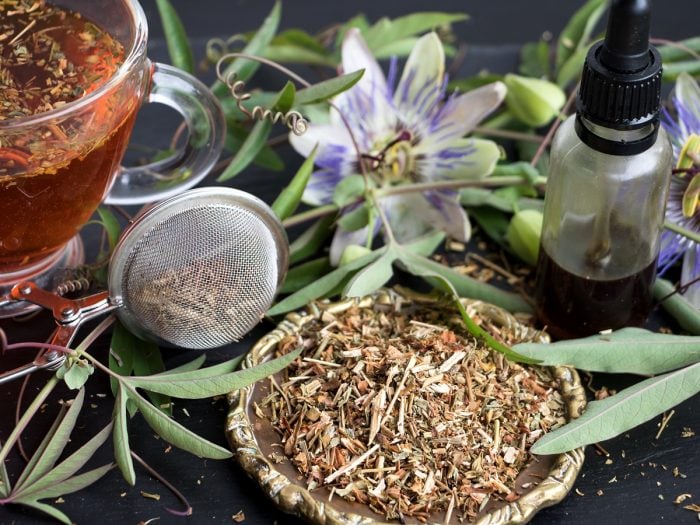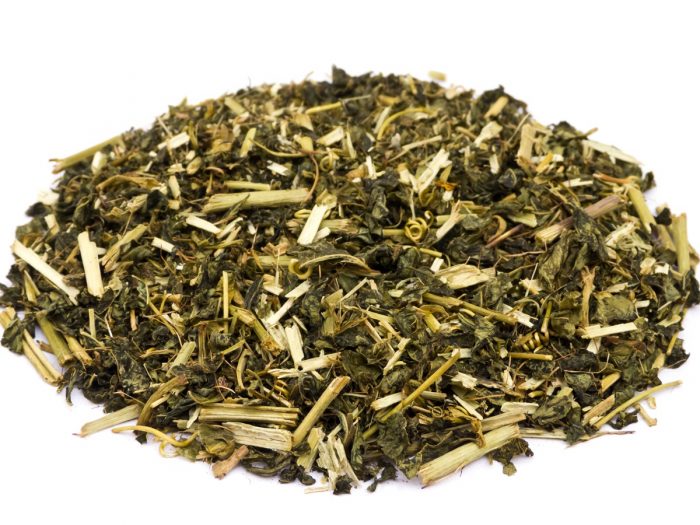Passionflower tea boasts many different benefits which may include the ability to reduce anxiety, treat sleep disorders,ease menopausal symptoms, stimulate libido, curb drug addiction, heal the skin, and lower blood pressure, among others.
What is Passionflower Tea?
The primary species used to make passionflower tea is taxonomically known as Passiflora incarnata, but there are more than 500 different species of passionflowers and vines that grow around the world. The plant is also known commonly as maypop. Passionflower tea has been used in North and South America for centuries, but was eventually introduced to European markets and is now globally sought after.
The flowers, leaves, and stems of this plant are all good for different medicinal applications, but the tea is brewed specifically with the leaves. Most of the health benefits of passionflower tea are the result of significant levels of harmine, flavonoids, and organic acids, such as linolenic, palmitic, and myristic acid, as well as various amino acids, coumarins, and other antioxidants. [1]
What is Passionflower Tea Good For?
Passionflower tea is good for treating insomnia, anxiety, addiction, high blood pressure, eczema, psoriasis, menopause, menstrual discomfort, infertility, and other inflammatory conditions.

Passionflower tea has been shown to reduce symptoms of anxiety and insomnia. Photo Credit: Shutterstock
May Aid in Menopausal Symptoms
Menopause can be a difficult and stressful time in life, resulting in mood swings, hormonal imbalances, anxiety, and sleeplessness. The sedative and soothing effects of passionflower tea can help balance your neurotransmitters, and also stimulate the release of gamma-aminobutyric acid (GABA), which is known to improve mood and regulate hormones. [2]
May Aid in Skin Conditions
Traditional use of passionflower tea includes its application for rashes, burns, irritation or inflammation of the skin. This can come in many forms, from eczema and psoriasis to acne, burns, and allergic reactions. The topical application of this tea is not common, but a powerful brew can have notable effects in treating these conditions. [3]
May Reduce Inflammation
Reducing inflammation throughout the body is what many organic acids and antioxidants are best at, and the compounds found in passionflower tea are no exception. This tea has long been recommended for joint disorders and arthritis, as well as gout, hemorrhoids, and inflammation of the gut. These soothing active ingredients can help relieve symptoms of indigestion, constipation, diarrhea, bloating, and cramping, as well as chronic inflammation caused by free radical activity. [4]
May Increase Sex Drive
If you want to increase your libido, this tea might be the secret, as it can increase the production of testosterone in the body, giving men a reproductive boost, not only increase sex drive but also virility and fertility.
May Improve Heart Health
The potential blood pressure-lowering qualities of passionflower tea are well known and may be the result of a specific antioxidant compound known as edulilic acid. By treating hypertension, this tea can help prevent atherosclerosis and generally, reduce the strain on the cardiovascular system. This effect can also help relieve headaches and migraines, by reducing the pressure and inflammation in capillaries near the temples. [5]
May Act As A Remedy for Sleep Disorders
This herbal tea has long been used to treat sleep disorders, such as insomnia or restlessness at night. By possibly impacting the neurotransmitter levels in the brain with flavonoids and other phytochemicals, you can enjoy a full night of undisturbed sleep and a refreshed feeling in the morning! [6]
May Help Curb Addiction
Some people have turned to passionflower tea to curb drug addiction, by soothing the symptoms of withdrawal, improving mood and reducing anxiety. Furthermore, anecdotal evidence points to passionflower tea’s potential ability to reduce nicotine cravings, making it important for those trying to quit smoking. [7]
How Do You Make Passionflower Tea?
If you want to brew passionflower tea at home, all you need is dried or fresh passionflower leaves and hot water, in addition to any sweeteners you may desire. Dried leaves can either be crushed into a powder to infuse in the tea, or the leaves can be placed in an infuser or tea strainer. Fresh leaves can also be used to brew this tea, in which case about a 1/4 cup of the leaves is required for a strong brew.

Calming Passionflower Tea Recipe
Ingredients
- 5 grams powdered dried passionflower leaves or
- 1/4 cup fresh passionflower leaves
- 2 cups water filtered
- honey optional
Instructions
- Add the powdered passionflower leaves to a stainless steel pot.

- Add water and bring the water up to a boil. Let the leaves simmer for 10 minutes. If you want the tea stronger, let it simmer for 15 minutes.
- Remove from heat and cool, then strain the tea into a teapot or mug.
- Add honey or sugar, if desired, and enjoy!

Notes
Side Effects of Passionflower Tea
For all the benefits of this herbal tea, there are also quite a few side effects, including vomiting, nausea, stomach upset, cognitive distress, drowsiness, dizziness, gastrointestinal problems, hypotension, and muscle spasms. However, these side effects are rare, and mainly affect people allergic to members of the Passiflora genus, or people who consume an excessive amount of this tea.
While most of these side effects are the result of drinking an excessive amount of this tea, you should still monitor your use and reaction to this tea carefully. [8]
- Pregnancy: One of the stimulant properties of this powerful tea affects uterine contractions, which can be very dangerous for pregnant women, and can even result in miscarriages or premature labor. Breastfeeding women are also advised not to consume this beverage, as it can pass along potent chemicals to their child.
- Cognitive Confusion: Common side effects of drinking large quantities of passionflower tea include dizziness, lack of coordination, mental confusion, and anxiety. If you experience any of these side effects, discontinue use and avoid operating motor vehicles or taking any physical risks.
- Gastrointestinal Distress: Nausea, vomiting, bloating and cramping have been reported when high levels of this tea are consumed, as the active components can cause inflammation in the gut.
- Blood Pressure: Being able to lower blood pressure is a benefit to heart health, but in combination with other blood pressure-lowering medications, it can be dangerous, resulting in fainting, lightheadedness, drowsiness, and muscle weakness.
- Sedation: The sedative properties of this tea are highly praised, but they can also cause negative reactions with certain medications, such as antispasmodic, and anti-anxiety medications, resulting in highly intensified sedative effects. If you are prescribed any of these medications, speak with your doctor before adding passionflower tea to your daily or weekly health regimen.

